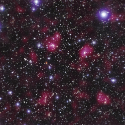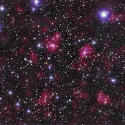Cosmic consistency check
The leading interpretation of why the expansion of the Universe is apparently accelerating is the presence of dark energy. Long before the supernova observations that indicated an accelerating Universe, Einstein proposed the idea of a cosmological constant, which says that dark energy homogeneously fills all of space as a constant energy density. Numerous other ideas, involving the variation of dark energy in time and space, have gained substantial interest. However, it is difficult to distinguish among them with either present data or those expected to be available in the next few years.
The main sources of these data are measurements of how the luminosity of supernovae depends on redshift and therefore distance. To interpret these data with dark-energy theories requires necessarily oversimplified parametrizations and assumptions (based on inferences from other data) about the matter density and curvature of the Universe. In a paper appearing in Physical Review Letters, Caroline Zunckel of Oxford University and Chris Clarkson of the University of Cape Town develop a new approach, which could more independently distinguish among dark-energy theories. They introduce a new measure, based only on luminosity-distance data, which does not require knowledge of the cosmic matter density and would be zero if the cosmological constant is correct. Conversely, finding a nonzero value would indicate that some other explanation of dark energy must be valid.
This test alone would be unable to firmly establish the cosmological constant as the unique picture of dark energy, but it would considerably narrow the possibilities. – Stanley Brown





